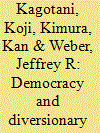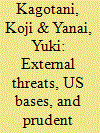| Srl | Item |
| 1 |
ID:
131386


|
|
|
|
|
| Publication |
2014.
|
| Summary/Abstract |
Since its democratization, South Korea's foreign relations with Japan have become increasingly volatile. We investigate the diversionary incentives behind these fluctuations in South Korean foreign policy during 1988-2011. We show evidence that, similar to mature democracies, economic turmoil is driving Korean leaders to divert the public attention toward low-intensity disputes against Japan. However, unlike mature democracies, our results reveal that public approval ratings and national elections do not encourage leaders to engage in the diversionary behavior due to South Korean domestic political institutional settings and party system. These findings highlight challenges to foreign policy making in a new democracy, an issue that has not been considered in detail in the literature. We conclude that although historical antagonism and US commitment to East Asia may affect the Japan-South Korea relationship, economic diversionary incentives significantly determine the fluctuations in Japan-South Korea disputes.
|
|
|
|
|
|
|
|
|
|
|
|
|
|
|
|
| 2 |
ID:
131388


|
|
|
|
|
| Publication |
2014.
|
| Summary/Abstract |
A number of US overseas bases were deployed around the world to protect allies and maintain regional peace. Some bases have been stationed in the partner countries for the long term, whereas others were withdrawn from their partners' territories in the face of strong local opposition. Understanding local support for US overseas bases is indispensable for managing alliance politics and pursuing US grand strategy. This article addresses the 1972-2006 Okinawa gubernatorial elections where the US base issue had been chronically politicized and locals supported pro-base candidates six out of ten times contrary to their anti-base preferences. This article addresses external threats as a determinant of vote choice. We analyze the gubernatorial elections as the opportunities for Okinawans to convey their support for or opposition to the current national security policy since US bases in Okinawa are critical to Japan's security. We find that external threats do encourage Okinawans to support pro-base candidates, but the effect of perceived security-related risks is moderate. Moreover, physical and psychological costs such as airplane crashes, environmental and noise pollution, and rape incidents have larger influence on the election outcomes rather than material benefits such as the fiscal transfers and base-related subsidies, which is contrary to the conventional view.
|
|
|
|
|
|
|
|
|
|
|
|
|
|
|
|